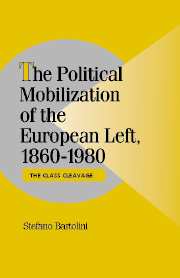Book contents
- Frontmatter
- Contents
- List of Figures and Tables
- Dedication
- Acknowledgments
- Introduction
- 1 THE CLASS CLEAVAGE: CONCEPTUAL AND METHODOLOGICAL FRAMEWORK
- 2 THE EUROPEAN LEFT: SIZE, IDEOLOGICAL ORIENTATION, AND ORGANIZATIONAL COHESION
- 3 INDUSTRIALIZATION, URBANIZATION, AND LABOR'S RESPONSE
- 4 CULTURAL HETEROGENEITY
- 5 ENFRANCHISEMENT
- 6 ORGANIZATIONAL STRUCTURING AND MEMBERSHIP MOBILIZATION
- 7 POLITICAL INTEGRATION
- 8 CLEAVAGE STRUCTURES
- 9 THE COMMUNIST SPLIT: UNITED AND DIVIDED LEFTS
- 10 THE MACROCONSTELLATION OF CLASS CLEAVAGE STRUCTURING
- DATA APPENDIX
- References
- Index
- CAMBRIDGE STUDIES IN COMPARATIVE POLITICS
7 - POLITICAL INTEGRATION
Published online by Cambridge University Press: 20 October 2009
- Frontmatter
- Contents
- List of Figures and Tables
- Dedication
- Acknowledgments
- Introduction
- 1 THE CLASS CLEAVAGE: CONCEPTUAL AND METHODOLOGICAL FRAMEWORK
- 2 THE EUROPEAN LEFT: SIZE, IDEOLOGICAL ORIENTATION, AND ORGANIZATIONAL COHESION
- 3 INDUSTRIALIZATION, URBANIZATION, AND LABOR'S RESPONSE
- 4 CULTURAL HETEROGENEITY
- 5 ENFRANCHISEMENT
- 6 ORGANIZATIONAL STRUCTURING AND MEMBERSHIP MOBILIZATION
- 7 POLITICAL INTEGRATION
- 8 CLEAVAGE STRUCTURES
- 9 THE COMMUNIST SPLIT: UNITED AND DIVIDED LEFTS
- 10 THE MACROCONSTELLATION OF CLASS CLEAVAGE STRUCTURING
- DATA APPENDIX
- References
- Index
- CAMBRIDGE STUDIES IN COMPARATIVE POLITICS
Summary
The socialist movement was an outsider for the conservative or liberal groups that controlled the political system in the second half of the nineteenth century. To establish itself, it had to penetrate the system and it faced varying degrees of resistance in this enterprise. The ease with which it came to be recognized as a legitimate political actor and the barriers it had to overcome to achieve this status – in a nutshell, the pattern of political integration – influenced its electoral strength, organizational cohesion, and radicalness of stance. Thus, the extent to which working-class political movements felt they could pursue and achieve their goals and values within the existing framework of state and political institutions was shaped by the learning experience deriving from the responses of the dominant groups and established elite when facing their demands.
The goal of this chapter is to assess the European variation in institutional “openness” to the new claimants' demands and organizational efforts, assuming that political alienation was as important as, if not more so than, social dislocation and economic deprivation in setting the context of the political response of new lower-class claimants. I compare the earliness and the level of left institutional integration, concentrating on four institutional obstacles to entry into the dominant pattern of political competition:
The extent to which demands made by the political movement of the working class were met by the established elite and institutions' use of nonpolitical means of confrontation, that is, direct legal and administrative repression and harassment. In other words, I consider to what extent and with what efficacy the state, as an administrative and policing machine, was used against the rising working-class movement.
[…]
- Type
- Chapter
- Information
- The Political Mobilization of the European Left, 1860–1980The Class Cleavage, pp. 312 - 410Publisher: Cambridge University PressPrint publication year: 2000



